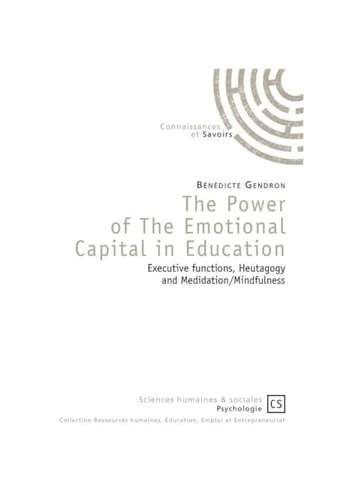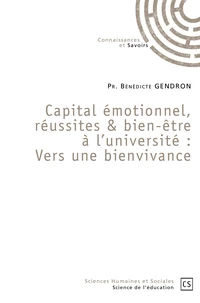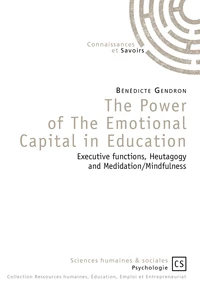The Power of The Emotional Capital in Education. Executive functions, Heutagogy and Medidation/Mindfulness
Par :Formats :
Disponible dans votre compte client Decitre ou Furet du Nord dès validation de votre commande. Le format Multi-format est :
- Pour les liseuses autres que Vivlio, vous devez utiliser le logiciel Adobe Digital Edition. Non compatible avec la lecture sur les liseuses Kindle, Remarkable et Sony
 , qui est-ce ?
, qui est-ce ?Notre partenaire de plateforme de lecture numérique où vous retrouverez l'ensemble de vos ebooks gratuitement
Pour en savoir plus sur nos ebooks, consultez notre aide en ligne ici
- Nombre de pages136
- FormatMulti-format
- ISBN978-2-342-16343-8
- EAN9782342163438
- Date de parution28/09/2018
- Protection num.NC
- Infos supplémentairesMulti-format incluant ePub avec ...
- ÉditeurConnaissances & Savoirs
Résumé
The emotional capital (EK), this powerful functionning capital which was missing in economics measurement, is the capital driving heart, mind, soul and behaviours which could changes the world by changing ourselves. It's a three levels economics' concept (micro, meso and macro). Developed by Gendron in the early 2000s, the "Emotional Capital is the stock of the personal and social emotional competencies that is inherent in the person, useful for personal, professional and organizational developments, and participates to social cohesion and has global and personal, economic and social returns".
Activating executive functions, the emotional capital is developed by active positive and collaborative pedagogy (heutagogy) and by practising mindfulness and meditation, bringing back the joy of learning by collaborative and creative learning, re-enchanting teaching. As a means of production, society contribution and personal developments, each additional investment in EK yields additional outputs at the three levels helping at performing better socially, economically and personally.
In eudaimonic economics, the EK participates not only to the socio-economic growth but also to the society' cohesion and happiness as environmental concerns, underlying the relevance of education for the social and economic welfare, and the environmental protection. Thus, there is an emergency to invest in Emotional Capital to follow Mandela' mottos, to fulfill Sen's lifetime achievement and development as freedom and feed Gandhi's empowerment and emancipation, to allow a Better World.
Activating executive functions, the emotional capital is developed by active positive and collaborative pedagogy (heutagogy) and by practising mindfulness and meditation, bringing back the joy of learning by collaborative and creative learning, re-enchanting teaching. As a means of production, society contribution and personal developments, each additional investment in EK yields additional outputs at the three levels helping at performing better socially, economically and personally.
In eudaimonic economics, the EK participates not only to the socio-economic growth but also to the society' cohesion and happiness as environmental concerns, underlying the relevance of education for the social and economic welfare, and the environmental protection. Thus, there is an emergency to invest in Emotional Capital to follow Mandela' mottos, to fulfill Sen's lifetime achievement and development as freedom and feed Gandhi's empowerment and emancipation, to allow a Better World.
The emotional capital (EK), this powerful functionning capital which was missing in economics measurement, is the capital driving heart, mind, soul and behaviours which could changes the world by changing ourselves. It's a three levels economics' concept (micro, meso and macro). Developed by Gendron in the early 2000s, the "Emotional Capital is the stock of the personal and social emotional competencies that is inherent in the person, useful for personal, professional and organizational developments, and participates to social cohesion and has global and personal, economic and social returns".
Activating executive functions, the emotional capital is developed by active positive and collaborative pedagogy (heutagogy) and by practising mindfulness and meditation, bringing back the joy of learning by collaborative and creative learning, re-enchanting teaching. As a means of production, society contribution and personal developments, each additional investment in EK yields additional outputs at the three levels helping at performing better socially, economically and personally.
In eudaimonic economics, the EK participates not only to the socio-economic growth but also to the society' cohesion and happiness as environmental concerns, underlying the relevance of education for the social and economic welfare, and the environmental protection. Thus, there is an emergency to invest in Emotional Capital to follow Mandela' mottos, to fulfill Sen's lifetime achievement and development as freedom and feed Gandhi's empowerment and emancipation, to allow a Better World.
Activating executive functions, the emotional capital is developed by active positive and collaborative pedagogy (heutagogy) and by practising mindfulness and meditation, bringing back the joy of learning by collaborative and creative learning, re-enchanting teaching. As a means of production, society contribution and personal developments, each additional investment in EK yields additional outputs at the three levels helping at performing better socially, economically and personally.
In eudaimonic economics, the EK participates not only to the socio-economic growth but also to the society' cohesion and happiness as environmental concerns, underlying the relevance of education for the social and economic welfare, and the environmental protection. Thus, there is an emergency to invest in Emotional Capital to follow Mandela' mottos, to fulfill Sen's lifetime achievement and development as freedom and feed Gandhi's empowerment and emancipation, to allow a Better World.







